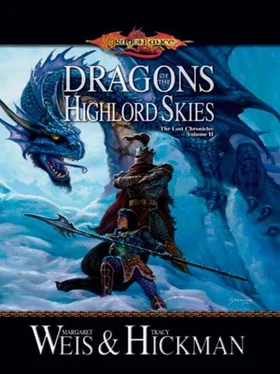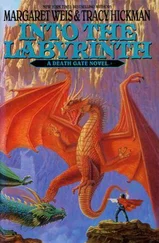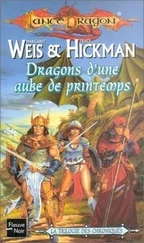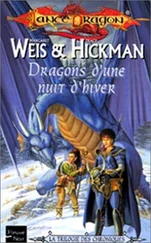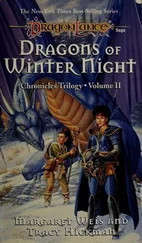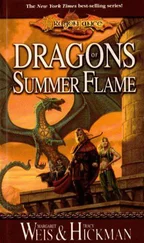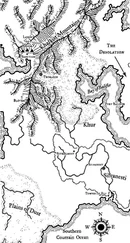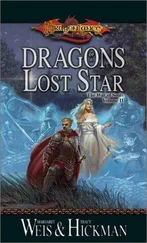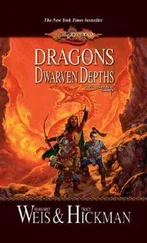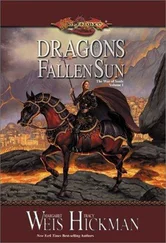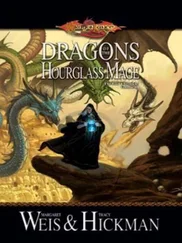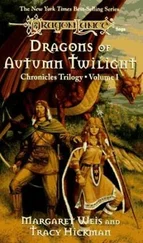Margaret Weis - Dragons of the Highlord Skies
Здесь есть возможность читать онлайн «Margaret Weis - Dragons of the Highlord Skies» весь текст электронной книги совершенно бесплатно (целиком полную версию без сокращений). В некоторых случаях можно слушать аудио, скачать через торрент в формате fb2 и присутствует краткое содержание. Жанр: Фэнтези, на английском языке. Описание произведения, (предисловие) а так же отзывы посетителей доступны на портале библиотеки ЛибКат.
- Название:Dragons of the Highlord Skies
- Автор:
- Жанр:
- Год:неизвестен
- ISBN:нет данных
- Рейтинг книги:3 / 5. Голосов: 1
-
Избранное:Добавить в избранное
- Отзывы:
-
Ваша оценка:
- 60
- 1
- 2
- 3
- 4
- 5
Dragons of the Highlord Skies: краткое содержание, описание и аннотация
Предлагаем к чтению аннотацию, описание, краткое содержание или предисловие (зависит от того, что написал сам автор книги «Dragons of the Highlord Skies»). Если вы не нашли необходимую информацию о книге — напишите в комментариях, мы постараемся отыскать её.
Dragons of the Highlord Skies — читать онлайн бесплатно полную книгу (весь текст) целиком
Ниже представлен текст книги, разбитый по страницам. Система сохранения места последней прочитанной страницы, позволяет с удобством читать онлайн бесплатно книгу «Dragons of the Highlord Skies», без необходимости каждый раз заново искать на чём Вы остановились. Поставьте закладку, и сможете в любой момент перейти на страницу, на которой закончили чтение.
Интервал:
Закладка:
“As for Kitiara uth Matar, she followed a different path from that of her friends. Whereas they walked the path of light, she walked a path that led to darkness. She joined the dragonarmies of Queen Takhisis, and it was not long before Kitiara’s skill and ambition caused her to rise to become Dragon Highlord of the Blue Dragonarmy, known to most of Ansalon as the Blue Lady.
“The individual adventures of Kitiara and Laurana and what happens to them at this point in time have never been told—until now. In the book Dragons of the Highlord Skies , the two women in the life of Tanis Half-elven each go on separate journeys whose perils will lead both of them to face their greatest challenges. I myself play a small part in this tale.
“It all begins…”
BOOK I
PROLOGUE
Over three hundred years had passed since he had last heard the sound of a human voice. Or rather, since he last heard a human speak. He had heard screams since then; screams from those who had come to Dargaard Keep to confront him, screams that ended in gurgling gasps as they choked on their own blood.
Lord Soth had no patience with such fools. He had no patience with those who came seeking his storied treasure. He had no patience with those who come on gallant quests to rid the world of his evil, for he knew the truth (who better than one who had once ridden on his own knightly quests?). He knew the knights were self-serving, self-seeking, interested only in glory, in hearing their names spouted by the bards. He saw through the shining armor to the spots of darkness that stained black the white purity of their souls. Their courage leaked through those spots when he confronted them, oozed out of them, and they clattered to their knees, trembling in their shining armor, and begged for mercy.
Lord Soth had none to give.
Who had shown him mercy? Who had heard his cries? Who heard them now? The gods had returned, but he was too proud to beg Paladine’s forgiveness. Lord Soth did not believe forgiveness would be granted, and deep within, the death knight did not think it should be granted.
He sat upon his throne inside the great hall of his ruined keep listening, night after endless night, to the spirits of the accursed elf women who were doomed to sing as he was doomed to hear the ballad of his crimes. They sang of a gallant and handsome knight whose wayward passions led him to seduce an elf maiden and get her with child. They sang of the betrayed wife conveniently removed, so the elf maid could be welcomed to Dargaard Keep. They sang of the new wife’s horror when she learned the truth and of her prayers to the gods, pleading with them that there was yet some good in Soth and begging them to grant him a chance for salvation.
They sang of the gods’ answer: Lord Loren Soth would be given the power to persuade the Kingpriest to abandon his notion of proclaiming himself a god, thus averting the wrath of the gods. Soth could prevent the disaster of the Cataclysm, save the lives of thousands of innocents, leave his child a name of which he would be proud. They sang of Soth’s journey to Istar, determined to save mankind, though he himself would be lost. They sang of their part, these accursed elf women, who halted him on the road, telling him lies about his lover. They sang of secret trysts with other men and a child that was not his.
They sang of Soth’s rage as he rode back to his castle, and of how he ordered his wife into his presence and there denounced her as a whore, her child a bastard. They sang of shuddering earth as the fiery mountain cast down by the gods crashed into Istar, causing the huge chandelier, resplendent with a hundred flaming candles, to fall from the ceiling and crash down upon his wife and child. They sang about how he could have saved them, but he was consumed with hate and the thirst for revenge and he watched his wife’s hair catch fire and heard his little child’s frantic screams as soft flesh blistered and bubbled. They sang, every night, about how he turned upon his heel and walked away.
Last they sang—and he would always and forever hear his wife’s curse upon him—that he would live forever, a knight pledged to death and darkness, forced to dwell upon his crimes as time passed him by, his minutes endless as hours, his hours endless as years, his years hollow and empty and cold as only the unredeemed dead are cold.
In all those years it had been so long since he had heard a voice speak to him that when one did, he thought for a moment it was a part of his black musings and he paid it no heed.
“Lord Soth, I have thrice called out to you,” the voice said, imperious in tone, angry at being ignored. “Why do you not answer?”
The death knight, clad in armor that was blackened by fire and stained with blood, peered out through the eyeslits of his helm. He saw a woman magnificent and beautiful, dark and cruel as the Abyss over which she ruled.
“Takhisis,” he said, not rising.
“ Queen Takhisis,” she returned, displeased.
“You are not my Queen,” he said.
Takhisis glowered down at him and her aspect changed. She transformed from a human female into an enormous dragon with five writhing, hissing, and spitting heads. She towered over him, a creature of terror, and each head shrieked at him in rage.
“The gods of light made you what you are, but I can unmake you!” Takhisis hissed. The dragon heads with their dripping fangs darted at him, menacing him. “I will cast you into the Abyss and break you, smite you and torment you for all eternity.”
The goddess’s fury had once shattered a world, yet Lord Soth did not quail beneath it. He did not fall to his knees or shake or shiver. He remained seated on his throne and gazed up at her with eyes of flame that burned calm and steady, unafraid and unimpressed.
“What would be the difference between that tortured existence and the one I now endure?” he asked her quietly.
The five heads ceased their attacks and hovered over him, five brains confounded. After a moment, the dragon disappeared and the woman returned, a smile upon her lips, her tone seductive, purring, persuasive.
“I did not come here to quarrel, my lord. Though you have hurt me, wounded me deeply, I am prepared to forgive you.”
“How have I hurt you, Takhisis?” he asked, and though there was nothing left of his face it seemed to her he smiled sardonically.
“You serve the cause of darkness—” she began.
Lord Soth made a gesture of negation, as much as to say he served no cause, not even his own.
“—yet you hold yourself aloof from the glorious battle we are waging,” Takhisis said. “The Emperor Ariakas would be proud to have you under his command—”
The flame of Lord Soth’s eyes flickered, but Takhisis was so caught up in the passion of her cause that she did not see this.
“Yet here you sit,” she continued bitterly, “locked up in this blackened keep, bemoaning your fate while others fight your battles.”
“From what I have witnessed, Madame,” Soth said dryly, “your emperor is winning his battles. Much of Ansalon is under his control now. You have no need of me or my forces, so take yourself away and leave me alone.”
Takhisis regarded the death knight from beneath long lashes. The locks of her dark hair lifted and fell in the chill wind that gusted through the cracked and broken walls. The black tendrils reminded him of the writhing heads of the dragons.
“True, we are winning,” Takhisis stated, “and I have no doubt but that we will ultimately prevail. However, I say this to you and only to you, my lord, the gods of light have not been crushed as swiftly and as easily as I anticipated. Certain… um… complications have arisen. Emperor Ariakas and my Dragon Highlords would be grateful for your help.”
Читать дальшеИнтервал:
Закладка:
Похожие книги на «Dragons of the Highlord Skies»
Представляем Вашему вниманию похожие книги на «Dragons of the Highlord Skies» списком для выбора. Мы отобрали схожую по названию и смыслу литературу в надежде предоставить читателям больше вариантов отыскать новые, интересные, ещё непрочитанные произведения.
Обсуждение, отзывы о книге «Dragons of the Highlord Skies» и просто собственные мнения читателей. Оставьте ваши комментарии, напишите, что Вы думаете о произведении, его смысле или главных героях. Укажите что конкретно понравилось, а что нет, и почему Вы так считаете.
